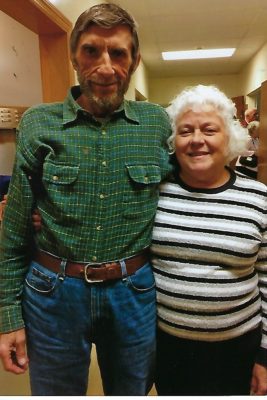
While many, many people minimize the Bible–or even discard it completely–as they try to live out their “Christian lives”, there are many who just don’t know what it says. This new series “What Does the Bible Say About…” is for those of you who just don’t know. While I can’t make someone care about what the Bible says, I can help those of you that truly desire to know the truth found in God’s Word. Whether you are a new believer or you are someone who has been deceived by false doctrine and God is now opening your eyes or you are simply filled with a fresh hunger to know God’s Word and what it says, this series is for you.
So few people know what the Bible teaches about things anymore that most conversations are simply about personal opinions. But personal opinions (including mine) do not matter. Only what God says matters and we can only find this in God’s written Word: the Holy Bible. It is my desire that this series will help you learn what God has to say about certain topics and that, in learning this, you will be better able to sort through all of the stuff that comes your way when these topics are brought up at church, at family gatherings, or at work.
I have a few ideas about topics, but if you have any you’d like me to cover, please email me at leslie {at} growing4life {dot} net. I will be happy to do some research and dig in the Word to find answers, as my time allows.
This first installment will focus on false teachers. What exactly does the Bible teach about false teachers and our response to them? This seems like a good topic, because I am regularly called to task for pointing out false teachers or errant doctrine. I am told that I am being unloving and unkind and should focus elsewhere. I know that this same thing happens to many of you, as well. But what does the Word say about false teachers? Because that is all we really need to know.
So let’s start off by taking a little quiz and then I will cover each question, one-by-one below.

Okay, so do you have your answers in your head? Time to see what scripture has to say…
1. FALSE. Jesus did publicly denounce both the Pharisses and the Sadducees in Matthew 16. He does so again in Matthew 23. In Matthew 15:12-14 Jesus warns his disciples to stay away from the Pharisees–
Then His disciples came and said to Him, “Do You know that the Pharisees were offended when they heard this saying?”13 But He answered and said, “Every plant which My heavenly Father has not planted will be uprooted. 14 Let them alone. They are blind leaders of the blind. And if the blind leads the blind, both will fall into a ditch.”
While Jesus was always extremely kind and loving to those who were lost (such as Zacchaeus and the Samaritan Woman), we know that He treated false teachers–those who would pervert truth–with harshness. He even drove out the money changers and upturned the tables in the temple in righteous anger because these evil men were offending God’s Holy name (Matthew 21:12-13).
It is really important that we know and understand the Jesus of the Bible, rather than get our information from people who claim to “hear personal messages from Him” and describe Jesus from a source from which we have no way of knowing to be true. While that “Jesus” may be more appealing, the Jesus we find in the Bible is the real Jesus. And the real Jesus did not hesitate to call out false teachers.
2. FALSE. Calling out false teachers and making others aware of false teaching is actually one of the most loving things we can do. Think of it like this: If someone is running at top speed towards a cliff, would you just let them fall off the edge without shouting out a warning? Warning of false teachers is no different. Spiritual danger and calamity abounds when we leave the solid ground of sound doctrine and fall off the cliff and on to the hard, jagged rocks of false teaching. True loves calls out a warning. Paul puts it like this in Ephesians 4:14-16:
that we should no longer be children, tossed to and fro and carried about with every wind of doctrine, by the trickery of men, in the cunning craftiness of deceitful plotting, 15 but, speaking the truth in love, may grow up in all things into Him who is the head—Christ— 16 from whom the whole body, joined and knit together by what every joint supplies, according to the effective working by which every part does its share, causes growth of the body for the edifying of itself in love.
These verses make it clear that in order to have healthy growth in the body of Christ, we must hold truth in high esteem. Otherwise, we will be misguided and deceived by the trickery of men and carried away by false doctrine. This will lead to division and strife (which is exactly what we are seeing take place today).
And I John 3:18 confirms this, as well:
My little children, let us not love in word or in tongue, but in deed and in truth.
Speaking the truth is how we show love. Another example would be this: Let’s say your best friend finds out that your husband is having an affair. What is the most loving thing for her to do? Simply ignore it and pretend it isn’t happening? Is this what a loving friend who cares about you would do? Of course not. True friends tell the truth because they care more about the long-term ramifications and devastating consequences that will affect their friend than they care about the short-term hurt feelings and unpleasantness that may result from speaking the truth.
And I Timothy 3:3-6 clarifies and confirms this even further–
As I urged you when I went into Macedonia—remain in Ephesus that you may charge some that they teach no other doctrine, 4 nor give heed to fables and endless genealogies, which cause disputes rather than godly edification which is in faith. 5 Now the purpose of the commandment is love from a pure heart, from a good conscience, and from sincere faith, 6 from which some, having strayed, have turned aside to idle talk, 7 desiring to be teachers of the law, understanding neither what they say nor the things which they affirm.
Real division and disputes are caused by those who bring in the false teaching. Not by those who lovingly confront it. How backwards and upside down the church has become. We have swallowed unbiblical, politically-correct thinking “hook, line, and sinker”.
3. TRUE. We have several examples of Paul naming names in scripture. See 2 Timothy 1:15 and 4:14. Another example is 2 Timothy 2:16-18–
And their message will spread like cancer. Hymenaeus and Philetus are of this sort, 18 who have strayed concerning the truth, saying that the resurrection is already past; and they overthrow the faith of some.
We also see that John was unafraid to call out a false teacher in 3 John, verses 9-10:
I wrote to the church, but Diotrephes, who loves to have the preeminence among them, does not receive us. 10 Therefore, if I come, I will call to mind his deeds which he does, prating against us with malicious words. And not content with that, he himself does not receive the brethren, and forbids those who wish to, putting them out of the church.
If we have several examples of this in the scriptures from Jesus, Paul, and John, shouldn’t we naturally assume that it is not sinful to call out a false teacher? In fact, should we not consider it our duty? Let’s look at a few verses that command us to call out false teaching and false teachers–
Ephesians 5:11 And have no fellowship with the unfruitful works of darkness, but rather expose them.
Romans 16:17-18 Now I urge you, brethren, note those who cause divisions and offenses, contrary to the doctrine which you learned, and avoid them. 18 For those who are such do not serve our Lord Jesus Christ, but their own belly, and by smooth words and flattering speech deceive the hearts of the simple.
Jude 3-4 Beloved, while I was very diligent to write to you concerning our common salvation, I found it necessary to write to you exhorting you to contend earnestly for the faith which was once for all delivered to the saints. 4 For certain men have crept in unnoticed, who long ago were marked out for this condemnation, ungodly men, who turn the grace of our God into lewdness and deny the only Lord God and our Lord Jesus Christ.
4. FALSE. We are not to accept every wave of doctrine so that we can preserve unity. We can see this from the verses right above. We also know that Scripture teaches that true unity can only be protected by keeping our doctrine pure. I Timothy 6:3-5 says this:
If anyone teaches otherwise and does not consent to wholesome words, even the words of our Lord Jesus Christ, and to the doctrine which accords with godliness, 4 he is proud, knowing nothing, but is obsessed with disputes and arguments over words, from which come envy, strife, reviling, evil suspicions, 5 useless wranglings of men of corrupt minds and destitute of the truth, who suppose that godliness is a means of gain. From such withdraw yourself.
From such withdraw yourself. Notice it does not say “unify with” or “compromise”. Instead it says we are to withdraw ourselves from those who do not teach the truth.
5. FALSE. We know that unity cannot be more important than truth, because Jesus Himself says this in Luke 12:49-53:
I came to send fire on the earth, and how I wish it were already kindled! 50 But I have a baptism to be baptized with, and how distressed I am till it is accomplished! 51 Do you suppose that I came to give peace on earth? I tell you, not at all, but rather division. 52 For from now on five in one house will be divided: three against two, and two against three. 53 Father will be divided against son and son against father, mother against daughter and daughter against mother, mother-in-law against her daughter-in-law and daughter-in-law against her mother-in-law.
If unity were more important, He would never have said such a thing. But from these verses we can also realize that there are two paths that can never be unified. They are in complete opposition to one another and go two completely different directions. This is further confirmed in Matthew 7:13-14, where Jesus contrasts the narrow way with the broad way of destruction:
Enter by the narrow gate; for wide is the gate and broad is the way that leads to destruction, and there are many who go in by it. 14 Because narrow is the gate and difficult is the way which leads to life, and there are few who find it.
From these verses, we know that there is the path of truth and there is the path of falsehood and destruction and the two can never be unified. Therefore, truth will always have to trump the false unity that comes from compromising with unbiblical teaching. Compromised doctrine or teaching will automatically lead people to the broad road of destruction. Just as a drop of poison contaminates a clear glass of water, so even a drop of false teaching leads people away from the narrow path.
6. FALSE. I am not sure how so many passages on false teaching can be so intentionally ignored, but the Bible is clear in a number of places that false teaching is a very real thing and that we must be concerned about it–
I John 4:1-3 Beloved, do not believe every spirit, but test the spirits, whether they are of God; because many false prophets have gone out into the world. 2 By this you know the Spirit of God: Every spirit that confesses that Jesus Christ has come in the flesh is of God, 3 and every spirit that does not confess that Jesus Christ has come in the flesh is not of God. And this is the spirit of the Antichrist, which you have heard was coming, and is now already in the world.
2 Peter 2:1-3 But there were also false prophets among the people, even as there will be false teachers among you, who will secretly bring in destructive heresies, even denying the Lord who bought them, and bring on themselves swift destruction. 2 And many will follow their destructive ways, because of whom the way of truth will be blasphemed. 3 By covetousness they will exploit you with deceptive words; for a long time their judgment has not been idle, and their destruction does not slumber.
2 Corinthians 11:12-15 But what I do, I will also continue to do, that I may cut off the opportunity from those who desire an opportunity to be regarded just as we are in the things of which they boast. 13 For such are false apostles, deceitful workers, transforming themselves into apostles of Christ. 14 And no wonder! For Satan himself transforms himself into an angel of light. 15 Therefore it is no great thing if his ministers also transform themselves into ministers of righteousness, whose end will be according to their works.
Matthew 7:15-20 Beware of false prophets, who come to you in sheep’s clothing, but inwardly they are ravenous wolves. 16 You will know them by their fruits. Do men gather grapes from thornbushes or figs from thistles? 17 Even so, every good tree bears good fruit, but a bad tree bears bad fruit. 18 A good tree cannot bear bad fruit, nor can a bad tree bear good fruit. 19 Every tree that does not bear good fruit is cut down and thrown into the fire. 20 Therefore by their fruits you will know them.
I Thessalonians 5:21-22 Test all things; hold fast what is good. 22 Abstain from every form of evil.
7. TRUE. We do know that false teaching will continue to grow as we approach the last days, since the Bible makes this very clear–
Matthew 24:23-25 Then if anyone says to you, ‘Look, here is the Christ!’ or ‘There!’ do not believe it. 24 For false christs and false prophets will rise and show great signs and wonders to deceive, if possible, even the elect. 25 See, I have told you beforehand.
2 Timothy 3:1-7 But know this, that in the last days perilous times will come: 2 For men will be lovers of themselves, lovers of money, boasters, proud, blasphemers, disobedient to parents, unthankful, unholy, 3 unloving, unforgiving, slanderers, without self-control, brutal, despisers of good, 4 traitors, headstrong, haughty, lovers of pleasure rather than lovers of God, 5 having a form of godliness but denying its power. And from such people turn away! 6 For of this sort are those who creep into households and make captives of gullible women loaded down with sins, led away by various lusts, 7 always learning and never able to come to the knowledge of the truth.
2 Timothy 3:13-15 But evil men and impostors will grow worse and worse, deceiving and being deceived. 14 But you must continue in the things which you have learned and been assured of, knowing from whom you have learned them, 15 and that from childhood you have known the Holy Scriptures, which are able to make you wise for salvation through faith which is in Christ Jesus.
This is not my normal kind of post. However, it is my prayer that this post will not only help those who honestly want to know what the Bible says about false teachers, but that it can also be bookmarked and used as a reference for those of you who are faced with accusations that you are being divisive and unkind and unloving when you call out a false teacher. The verses above should bolster and encourage us when we are ready to cave or to just be quiet. God’s Word reminds us that we are doing the right thing by calling out false teaching and false teachers.
More and more, people will throw accusations as you seek to protect and defend God and the truth of His Word. They will marginalize you, call you names, and be angry with you. But we must be like soldiers and put on our spiritual armor (Ephesians 6:13f). We must be filled with love and grace as we fight, but we cannot back down. It takes a great deal of courage but God is faithful and He will give us the strength and boldness we need. Keep up the good fight, dear readers. Keep up the good fight.












